Risk Intelligence
ALSO BY DYLAN EVANS

Placebo: Mind over Matter in Modern Medicine
Emotion: The Science of Sentiment
Introducing Evolutionary Psychology
Introducing Evolution
An Introductory Dictionary of Lacanian Psychoanalysis
First published in the United States in 2012 by Free Press, a division of Simon & Schuster Inc., New York.
Published in trade paperback in Great Britain in 2012 by Atlantic Books, an imprint of Atlantic Books Ltd.
Copyright Dylan Evans, 2012
The moral right of Dylan Evans to be identified as the author of this work has been asserted by him in accordance with the Copyright, Designs and Patents Act of 1988.
All rights reserved. No part of this publication may be reproduced, stored in a retrieval system, or transmitted in any form or by any means, electronic, mechanical, photocopying, recording, or otherwise, without the prior permission of both the copyright owner and the above publisher of this book.
Every effort has been made to trace or contact all copyright holders. The publishers will be pleased to make good any omissions or rectify any mistakes brought to their attention at the earliest opportunity.
10 9 8 7 6 5 4 3 2 1
A CIP catalogue record for this book is available from the British Library.
Trade paperback ISBN: 978 1 84887 738 2
eISBN: 978 0 85789 926 2
Printed in Great Britain [printer fills in their details here].
Atlantic Books
An Imprint of Atlantic Books Ltd
Ormond House
2627 Boswell Street
London
WC1N 3JZ
www.atlantic-books.co.uk
To Louise, who took the risk of marrying me
Risk Intelligence
CHAPTER 1
Why Risk Intelligence Matters
He who knows best,
best knows how little he knows.
THOMAS JEFFERSON
K athryn, who is a detective, is good at spotting lies. While her colleagues seem to see them everywhere, she is more circumspect. When shes interviewing a suspect, she doesnt jump to conclusions. Instead she patiently looks for the telltale signs that suggest dishonesty. Even so, she is rarely 100 percent sure that shes spotted a lie; its more often a question of tilting the scales one way or another, she says.
Jamie is viewed as a bit of an oddball at the investment bank where he works. When everyone else is sure that prices will continue to go up, Jamie is often more skeptical. On the other hand, there are times when everyone else is pessimistic but Jamie is feeling quite bullish. Jamie and his colleagues are not always at odds, but when they disagree it tends to be Jamie who is right.
Diane is overjoyed about her new relationship. When she phones her best friend, Evelyn, to tell her all about the new man in her life, Evelyn urges caution. Whats the chance that youll still be with this guy in twelve months? she asks, as she has done before. Dianes reply is just as predictable. Oh, ninety, maybe ninety-five percent, she replies, as she always does. Im sure Danny is the one! Two months later, shes broken up again.
Jeff has just been promoted to the rank of captain in the US Army. Since he is new to the role, he often feels unsure of his decisions and seeks out his colonel for a second opinion. The colonel is beginning to get rather tired of Jeffs pestering him, and has taken to playing a little game. Whenever Jeff asks his opinion, he responds by asking how confident Jeff is of his own hunch. Usually Jeff replies that hes only about 40 or 50 percent sure. But nine times of out ten, the colonel agrees with Jeffs opinion.
These four people display different degrees of risk intelligence. Kathryn and Jamie have high risk intelligence, while Diane and Jeff are at the other end of the spectrum. What exactly do I mean by risk intelligence? Most simply put, it is the ability to estimate probabilities accurately, whether the probabilities of various events occurring in our lives, such as a car accident, or the likelihood that some piece of information weve just come across is actually true, such as a rumor about a takeover bid. Or perhaps we have to judge whether a defendant in a murder trial is guilty, or must decide whether its safe to take a trip to a country thats been put on a watch list. We often have to make educated guesses about such things, but fifty years of research in the psychology of judgment and decision making show that most people are not very good at doing so. Many people, for example, tend to overestimate their chances of winning the lottery, while they underestimate the probability that they will get divorced.
At the heart of risk intelligence lies the ability to gauge the limits of your own knowledgeto be cautious when you dont know much, and to be confident when, by contrast, you know a lot. People with high risk intelligence tend to be on the button in doing this. Kathryn and Jamie, for example, are relatively risk intelligent because they know pretty well how much they know and have just the right level of confidence in their judgments. Diane and Jeff are much less proficient, though in different ways; while Diane is overconfident, Jeff is underconfident.
This is a book about why so many of us are so bad at estimating probabilities and how we can become better at it. This is a vital skill to develop, as our ability to cope with uncertainty is one of the most important requirements for success in life, yet also one of the most neglected. We may not appreciate just how often were required to exercise it, and how much impact our ability to do so can have on our lives, and even on the whole of society. Consider these examples, from the relatively mundane to the life-threatening:
 You are buying a new 42-inch HDTV, and a sales assistant asks if you would also like to purchase an extended warranty. He explains that if anything goes wrong with your TV in the next three years, the warranty will entitle you to swap it for a brand-new one, no questions asked. When deciding whether or not to purchase the extended warranty, you should consider the price of the TV, the price of the warranty, and the probability that the TV will indeed go wrong in the next three years. But whats the chance that this will actually happen? Heres where your risk intelligence comes in.
You are buying a new 42-inch HDTV, and a sales assistant asks if you would also like to purchase an extended warranty. He explains that if anything goes wrong with your TV in the next three years, the warranty will entitle you to swap it for a brand-new one, no questions asked. When deciding whether or not to purchase the extended warranty, you should consider the price of the TV, the price of the warranty, and the probability that the TV will indeed go wrong in the next three years. But whats the chance that this will actually happen? Heres where your risk intelligence comes in.
 A bank manager is explaining to you the various options available for investing a windfall that has just come your way. Riskier investment funds pay more interest, but theres also a higher chance of making a loss. How much of your money should you allocate to the high-risk funds and how much to the low-risk ones? Its partly a question of risk appetite, but you also need to know more about how much riskier the high-risk funds are. Are they 2 percent or 10 percent riskier? You need, in other words, to put a number on it.
A bank manager is explaining to you the various options available for investing a windfall that has just come your way. Riskier investment funds pay more interest, but theres also a higher chance of making a loss. How much of your money should you allocate to the high-risk funds and how much to the low-risk ones? Its partly a question of risk appetite, but you also need to know more about how much riskier the high-risk funds are. Are they 2 percent or 10 percent riskier? You need, in other words, to put a number on it.
 Doctors have discovered a tumor in your breast. Luckily, it is not malignant. It will not spread to the rest of your body, and there is no need to remove your breast. But there is a chance that it may recur and become malignant at some time in the future, and it might then spread quickly. In order to prevent this possibility, the doctor suggests that you do, after all, consider having your breast removed. Its a terrible dilemma; clearly you dont want the cancer to recur, but it seems a tragedy to remove a healthy breast. How high would the chance of recurrence have to be before you decided to have the breast removed?
Doctors have discovered a tumor in your breast. Luckily, it is not malignant. It will not spread to the rest of your body, and there is no need to remove your breast. But there is a chance that it may recur and become malignant at some time in the future, and it might then spread quickly. In order to prevent this possibility, the doctor suggests that you do, after all, consider having your breast removed. Its a terrible dilemma; clearly you dont want the cancer to recur, but it seems a tragedy to remove a healthy breast. How high would the chance of recurrence have to be before you decided to have the breast removed?
When making evaluations in situations of uncertainty, people often make very poor probability estimates and may even ignore probabilities altogether, with sometimes devastating consequences. The decisions that we face, both individually and as a society, are only becoming more daunting. The following cases further illustrate how important it is that we learn to develop our risk intelligence.
Next page
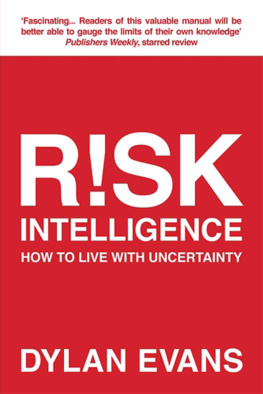
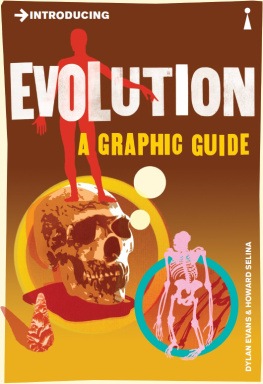
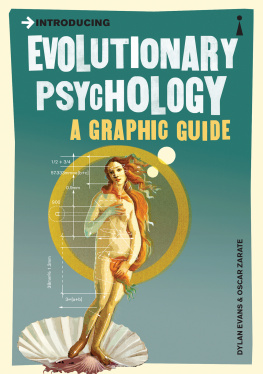
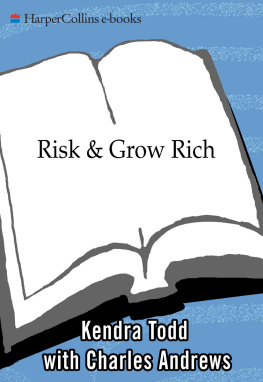
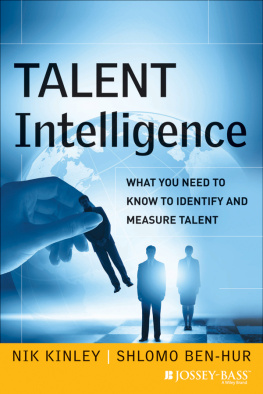
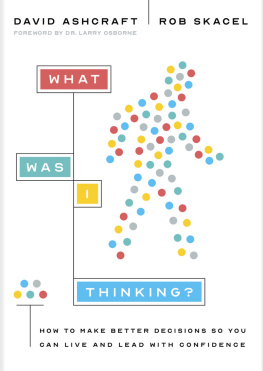

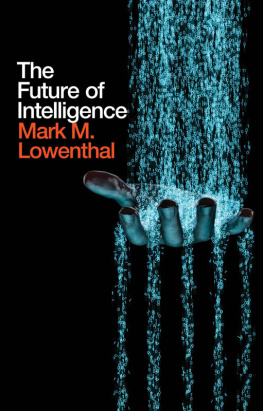
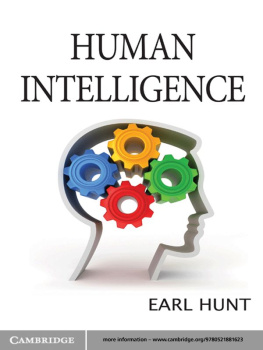
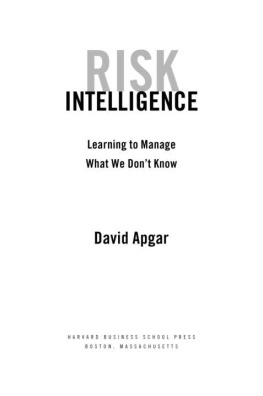

 You are buying a new 42-inch HDTV, and a sales assistant asks if you would also like to purchase an extended warranty. He explains that if anything goes wrong with your TV in the next three years, the warranty will entitle you to swap it for a brand-new one, no questions asked. When deciding whether or not to purchase the extended warranty, you should consider the price of the TV, the price of the warranty, and the probability that the TV will indeed go wrong in the next three years. But whats the chance that this will actually happen? Heres where your risk intelligence comes in.
You are buying a new 42-inch HDTV, and a sales assistant asks if you would also like to purchase an extended warranty. He explains that if anything goes wrong with your TV in the next three years, the warranty will entitle you to swap it for a brand-new one, no questions asked. When deciding whether or not to purchase the extended warranty, you should consider the price of the TV, the price of the warranty, and the probability that the TV will indeed go wrong in the next three years. But whats the chance that this will actually happen? Heres where your risk intelligence comes in.